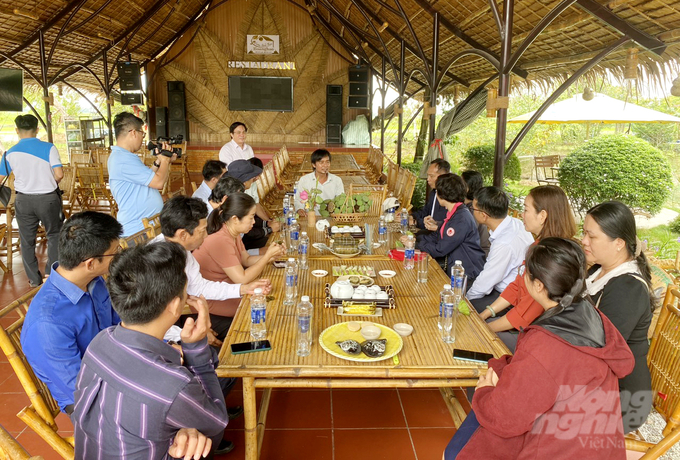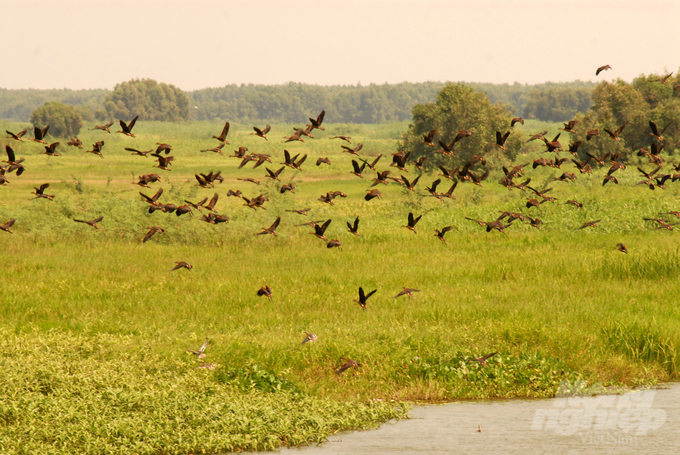May 24, 2025 | 21:17 GMT +7
May 24, 2025 | 21:17 GMT +7
Hotline: 0913.378.918
May 24, 2025 | 21:17 GMT +7
Hotline: 0913.378.918

Minister Le Minh Hoan chaired a discussion on enhancing community capacity and promoting farmers' knowledge on October 25 at the MARD. Photo: Duong Phuong.
During the discussion, C.P. Vietnam representative shared insights from their work with farmers in Tam Nong district, Dong Thap province, emphasizing the central role of farmers in developing community-based models. C.P. Vietnam and its partners are committed to building a sense of community through the philosophy of “Working together, sharing happiness.”
“In just one month, we organized 10 meetings to prepare materials and content for the three-day training course,” said Ms. Le Nhat Thuy, Senior Deputy General Director of C.P. Vietnam.
The training was designed to foster collaboration through interactive activities and games that help participants form meaningful connections, learn from one another, and offer mutual support.
To support these efforts, last July, a team from C.P. Vietnam visited Tam Nong district to assess the current situation and define a development strategy for Tram Chim Tourist Area. The trip focused on exploring operational methods, growth strategies, and strengthening linkages for local tourism products.

C.P. Vietnam supports Tam Nong in developing OCOP products. Photo: Le Hoang Vu.
Tram Chim Tourist Area attracts over one million visitors annually who come for sightseeing, experiential tourism, and scientific research. Accommodation options like homestays and farmstays in Tam Nong district serve tens of thousands of visitors, offering local souvenirs and OCOP products, generating revenues in the hundreds of millions to billions of VND each year.
In addition to tourism development, C.P. Vietnam actively supports Tam Nong in advancing OCOP (One Commune, One Product) initiatives, focusing on enhancing the value of local products and creating sustainable livelihoods for the community. By collaborating with local authorities, C.P. Vietnam aims to elevate these products, making them appealing to both domestic and international tourists.
Furthermore, C.P. Vietnam has been involved in other community-driven projects, aiming to empower farmers with the knowledge and tools to implement sustainable practices. The company’s community-centered approach aligns with the Ministry of Agriculture and Rural Development's vision for a resilient agricultural sector that adapts to modern challenges while uplifting local economies.
Minister Le Minh Hoan commended C.P. Vietnam’s approach, highlighting the importance of collaboration between the private sector and local farmers. “Our goal is not only to support agricultural development but to also bring economic and social benefits to rural communities,” the minister stated.
With ongoing projects like these, Tam Nong district is positioned to become a model for rural development, showcasing how strategic partnerships and community engagement can lead to meaningful progress.
Minister Le Minh Hoan expressed strong support for the approach of unlocking community capacity. The Minister remarked, “Among the many development goals, ‘No one gets rich alone’ is a guiding principle set forth by the Thai people for agricultural and rural development, established by the King of Thailand within the philosophy of self-sufficient economy.”
Minister Hoan emphasized that the first hurdle in the development process is the lack of essential resources, including land, assets, finances, labor, and event management and business expertise. “It is unrealistic to expect each household and agricultural farm to independently invest in the warehouses, workshops, and machinery necessary to preserve, pre-process, and process agricultural products to increase their added value”, he noted.

Tram Chim National Park (Dong Thap) has been recognized as the 4th Ramsar site in Vietnam and the 2,000th Ramsar site in the world. Photo: Le Hoang Vu.
He suggested that Vietnam could draw from Thailand’s experience with cooperation models, where farmers form groups, cooperatives, and community enterprises to ensure steady access to resources. This approach, he explained, is key to solving the challenge of increasing added value and embedding multiple layers of value in the production and trade of Thai agricultural products.
Minister Hoan called on MARD agencies to study the Thai philosophy of abundance, focusing on strategies to strengthen connections that boost the “profit pie” so that everyone can enjoy a larger share without competition. This is essential to fostering a collaborative, mutually beneficial agricultural sector where the prosperity of one enhances the prosperity of all.
By drawing on successful models from Thailand and fostering partnerships like those with C.P. Vietnam, MARD aims to build resilient rural economies where farmers are not only producers but valued stakeholders in a comprehensive value chain. This cooperative approach will be the foundation for a thriving agricultural future where the benefits of development are widely shared, enhancing the livelihoods of rural communities across the nation.
Translated by Quynh Chi

(VAN) In the tranquil wetlands of Van Long, there are quiet souls who guard the forests, nurture the waters, and oversee every bird and troop of langurs as protecting the essence of a living heritage.

(VAN) WWF, GIZ, IUCN, UNDP call for biodiversity conservation and sustainable development must be regarded as a unity in strategies for a green future.

(VAN) On celebration of International Day for Biological Diversity, Deputy Minister Nguyen Quoc Tri called for practical actions to address nature and biodiversity conservation.

(VAN) Dr. Hoang Thi Thanh Nhan – Deputy Director of the Nature and Biodiversity Conservation Agency – highlighted this on the International Day for Biological Diversity, May 22, 2025.
![Ho Chi Minh city adapts to climate change: [2] Accelerating action](https://t.ex-cdn.com/nongnghiepmoitruong.vn/608w/files/chiqk/2025/05/22/4024-4220-bien-doi-khi-hau-1-100626_766.jpg)
(VAN) Clearly recognizing the challenges posed by climate change, Ho Chi Minh city has swiftly shaped its policies and implemented practical solutions to adapt.

(VAN) Rice straw is no longer just a discarded byproduct, but it is becoming a green resource that helps farmers in the Mekong Delta reduce emissions and promote circular, sustainable agriculture.

(VAN) Other Effective Area-based Conservation Measures (OECMs) are solutions that contribute effectively to achieving the goals of the Kunming–Montreal Global Biodiversity Framework.